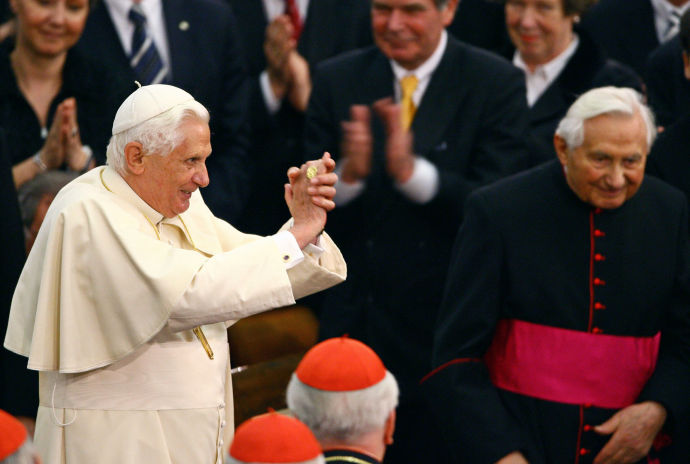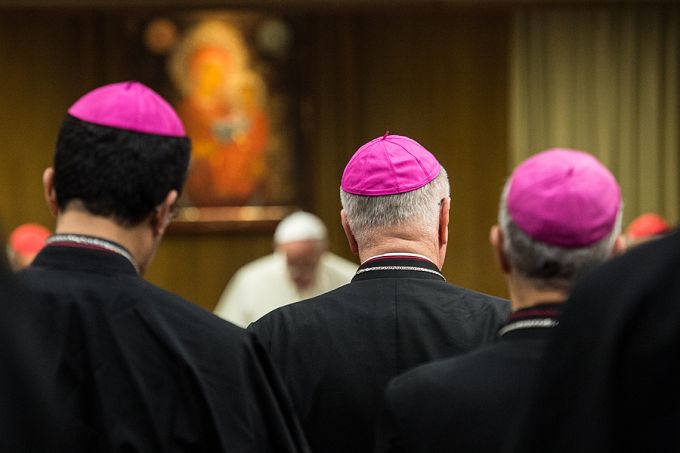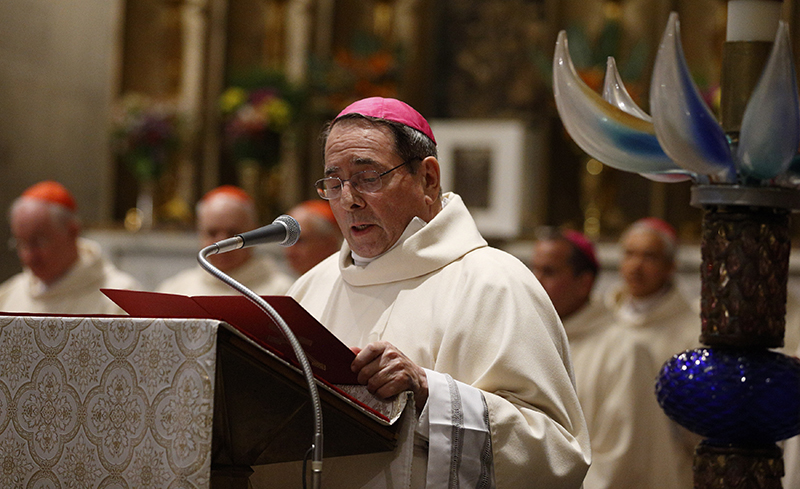
The election of Pope Francis, in 2013, had the effect, among other things, of displacing the painful story of priestly sexual abuse that had dominated public awareness of the Church during much of the eight-year papacy of his predecessor. The sense that the Church, both during the last years of Benedict and under Francis, had begun to deal more forcefully with the issue created a desire in many, inside and outside the Church, to move on. But recent events suggest that we take another careful look at this chapter of Church history before turning the page.
During the past week, a German lawyer charged with investigating the abuse of minors in a famous Catholic boys’ choir in Bavaria revealed that two hundred and thirty-one children had been victimized over a period of decades. The attorney, Ulrich Weber, who was commissioned by the Diocese of Regensburg to conduct the inquiry, said that there were fifty credible cases of sexual abuse, along with a larger number of cases of other forms of physical abuse, from beatings to food deprivation.
The news received widespread attention not only because of its disturbing content but because the director of the Regensburg boys’ choir from 1964 to 1994 was Georg Ratzinger, the older brother of Joseph Ratzinger, who became Benedict XVI. Joseph Ratzinger was the Archbishop of Munich from 1977 until 1981, when he went to head up the powerful Congregation for the Doctrine of the Faith, which establishes theological orthodoxy and was also one of the branches of the Church that dealt with priestly sexual abuse.
The developments in Germany raised the question of what the two Ratzinger brothers knew about the abuse in the Regensburg choir. Most of the sexual abuse took place, apparently, at a boarding school for elementary-grade students connected to the choir. The chief culprit, according to Weber, was Johann Meier, the boarding school’s director from 1953 until 1992. The composer Franz Wittenbrink, a graduate of the school, told Der Spiegel magazine, in 2010, when the abuse scandal became public, that there was “a system of sadistic punishments connected to sexual pleasure.”
At that time, Georg Ratzinger, who was on the three-person supervisory board of the elementary school, acknowledged that some choirboys had complained about the punishments they received at the school. “But I did not have the feeling at the time that I should do something about it,” he told the Passauer Neue Presse, in 2010. “Had I known with what exaggerated fierceness he was acting, I would have said something.”
In fact, accusations of abuse surfaced and were investigated in 1987, but no one saw fit to remove Meier from his post until the year of his death. When asked at his press conference last week whether Georg Ratzinger had been aware of the abuse, Weber replied, “Based on my research, I must assume so.” He estimated that a third of the students in the choir had suffered some form of abuse. Georg Ratzinger has said that he routinely slapped choirboys when their performance was not up to snuff, standard treatment until Germany banned corporal punishment, in the early eighties. So far, the Regensburg diocese has offered compensation of twenty-five hundred euros for each victim.
In the early nineties, a monk who worked at the Vatican told me, “You wouldn’t believe the amounts of money the church is spending to settle these priestly sexual-abuse cases.” He was not exaggerating. By 1992, Catholic dioceses in the U.S. had paid out four hundred million dollars to settle hundreds of molestation cases. These financial settlements were reached largely to keep the victims quiet: in almost all cases, the documents were sealed and the victims signed a non-disclosure agreement. Given the enormous amounts of money involved, the men running the Vatican were well aware of the problem.
The basic outlines of the sex-abuse scandal were already evident that year when Jason Berry, an American journalist, published his first book, “Lead Us Not Into Temptation.” (While the “Spotlight” team at the Boston Globe is rightly getting its moment of glory, praise is also due to Berry, whose pioneering work on the subject, a decade earlier, was done with far less institutional support.) As Berry reported, Ray Mouton, a lawyer whom the Church hired in 1985 to defend a pedophile priest in Louisiana, warned that, if the Church did not adopt a policy for helping victims and removing pedophiles from the ministry, it could face a billion dollars in losses from financial settlements and damage awards in the next decade. It turned out that Mouton had actually underestimated the financial cost of the crisis. By 2006, the Church had spent $2.6 billion settling sexual-abuse cases, as Berry wrote in the 2010 edition of “Vows of Silence,” his second book on the pedophile crisis, which he co-authored with fellow-journalist Gerald Renner.
Most cases of abuse were handled (or not handled) by local bishops and archbishops, but some were adjudicated by Cardinal Ratzinger’s Congregation for the Doctrine of the Faith. The most prominent of these cases was that of Father Marcial Maciel, a favorite of Pope John Paul II and the founder of the Legionaries of Christ, a powerful Mexican religious order that, at its pinnacle, included eight hundred priests, fifteen universities, and a hundred and fifty prep schools, as well as a lay movement with a reported seventy thousand followers.
In the seventies and eighties, former members of the Legionaries reported that, as young boys, they had been sexually abused by Maciel. As the Church later acknowledged, the complainants were highly credible and had no ulterior motives: they were not seeking monetary compensation or notoriety. They followed Church procedures by filing formal charges through ecclesiastical courts in Rome, but nothing was done. In fact, Pope John Paul II called on Maciel to accompany him on papal visits to Mexico in 1979, 1990, and 1993.
When one of the former Legionaries expressed his frustration, in the lawsuit, about the Church’s inaction, Berry and Renner reported in their book, the Legionaries’ own canon lawyer, Martha Wegan, who made no secret that her first loyalty was to the Church, replied, “It is better for eight innocent men to suffer than for millions to lose their faith.”
Cardinal Ratzinger reopened the case against Father Maciel in 2004, and, when he became Pope, in 2006, he acknowledged the validity of the claims, forbidding Maciel to continue his ministry and limiting him to a “life of prayer and penitence.” The Vatican found Maciel guilty of “very serious and objectively immoral acts . . . confirmed by incontrovertible testimonies” that represent “true crimes and manifest a life without scruples or authentic religious sentiment.
Though the sexual-abuse crisis reached its peak in the public sphere during Benedict XVI’s papacy, the single figure most responsible for ignoring this extraordinary accumulation of depravity is the sainted John Paul II. In the context of his predecessor’s deplorable neglect, Pope Benedict gets slightly higher marks than most. In 2001, he acted to give his office, the Congregation for the Doctrine of the Faith, jurisdiction over all sexual-abuse cases, and soon he began to push the Maciel investigation, despite considerable Vatican opposition. After ascending the throne of St. Peter, he became the first Pope to kick predator priests out of the Church: in 2011 and 2012, the last two full years of his papacy, the Church defrocked three hundred and eighty-four offending priests.
That said, it was too little, too late. As the second-most-powerful man in John Paul II’s pontificate, Ratzinger had more ability to know and to act than almost anyone. The actions he finally did take were largely dictated by a series of embarrassing scandals: his move to take control of pedophilia cases in 2001 closely followed scandals in the U.S., Ireland, and Australia, and staggering financial settlements for American plaintiffs. The decision to reopen the case against Maciel would almost certainly not have happened without the courageous reporting of Berry and Renner. And the zero-tolerance policy that led to the systematic defrocking of abusive priests happened only after the annus horribilis of 2010, in which a new sexual-abuse scandal seemed to explode every week and loyal parishioners left the Church in droves.
Ratzinger understood better than most, if late, that priestly abuse was the negation of everything the Church was supposed to stand for. But, for much of his career, his focus and priorities were elsewhere. During most of his tenure, the Congregation for the Doctrine of the Faith was too busy disciplining anyone who dared step out of line with Church teachings on personal sexuality and family planning to bother with the thousands of priests molesting children. In 2009, a nun named Margaret McBride sat on the ethics committee of a San Diego hospital that had to decide the case of a pregnant woman whose doctors believed that she (and her fetus) would die if they did not terminate her pregnancy. The committee voted to allow an abortion, and the woman’s life was saved. Almost immediately, McBride’s bishop informed her of her excommunication. It took multiple decades and thousands of cases of predatory behavior to begin defrocking priests, but not much more than twenty-four hours to excommunicate a nun trying to save a human life. In 2011, also under Pope Benedict, the Vatican lifted its excommunication of McBride.
A reëxamination of the sexual-abuse scandal may help the Church reconsider the standoff between traditionalists and progressives during Francis’s papacy. The traditionalists, who oppose changes such as offering communion to remarried couples, bemoan the good old days when papal authority was unquestioned, civil authorities treated the Church with extreme deference, and parishioners obeyed without objection. They have forgotten that those good old days were also a time when children were slapped, beaten, and often sexually abused, and priests, bishops, parents, and police looked away.
Complete Article HERE!



